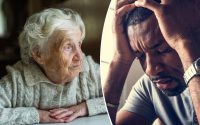I thought my cough was an infection — it’s terminal lung cancer
A young woman was rejected from the doctor’s office and told to drink cough syrup for what she thought was a viral infection. She later learned it was terminal cancer.
Alix Burnard, 29, developed a cough in March 2021. She took several COVID tests which all returned negative and assumed she had caught a viral bug.
As time went on, her symptoms worsened, with her neck swelling up and causing her serious pain as well as her lymph nodes around her chest and shoulders swelling up so much that they hid her collar bone.
Burnard, from Berkshire, UK, initially thought she had slept weird and began looking for chiropractors before the gravity of her symptoms settled in.
“It was quite obvious that something more serious was wrong,” Burnard told NeedToKnow.online.
“I kept calling the doctor’s surgery when I felt unwell, but they only suggested cough syrup to help, and wouldn’t see me in the GP surgery because of COVID.”

But by May 2021, Burnard was struggling to breathe and couldn’t talk without running out of air. She was constantly coughing up phlegm to the point where she would get sick and couldn’t leave the house without a cup to cough up into. She also suffered from intense night sweats and lost so much weight that her clothes no longer fit.
Due to the pandemic, Burnard was unable to be seen by a doctor right away and was told to take a series of tests for glandular fever and antibiotics all of which did not help.
Burnard was struggling and knew something was seriously wrong, so she continued to call her doctor and was finally accepted to be seen. After being examined by a doctor, Burnard was immediately sent to the emergency room.
Doctors initially feared Burnard may be suffering from tuberculosis but soon ruled it out with testing. She was sent home until a CT scan in June 2021 would change her life forever.

“As soon as I’d had the CT scan, doctors started talking to me in a different manner, and it was then it was suggested that this was something more sinister,” she shared.
Burnard was sent to the cancer ward where she lived for a week undergoing a biopsy and PET scan. She was also on several IV bags of antibiotics as she also fought off pneumonia.
“It was during this time I was told that I had cancer,” Burnard said. “I couldn’t believe what was happening to me — I wasn’t expecting any of this at all.”
“I thought I had a chest infection, and I would get better. I was always really healthy, I’ve never smoked, rarely drink, exercise, and I eat plant-based food. There was nothing in my lifestyle that would make me think cancer was even a possibility.”

While struggling to come to terms with her diagnosis, Burnard was left alone in the hospital with no support due to the pandemic.
“I spent the whole time I was in hospital on my own, I wasn’t allowed a single visitor because of COVID,” she explained.
“I went through some of the hardest, most upsetting days of my life without a single familiar face, and I found it really hard.”
Doctors later confirmed that Burnard was suffering from adenocarcinoma — cancer that forms in the glandular tissue. By the time Burnard was finally diagnosed, the cancer had spread to her liver, lymph nodes, shoulder, spine and pelvis.

“I didn’t really understand what this meant, and it took another doctor to explain to me that I had incurable cancer,” she said. “I was heartbroken at the news. I remember telling a friend and saying to her that I’m likely to die of this disease one day.”
Burnard was sent home from the hospital for two weeks and continued growing weaker from pneumonia which she developed as a result of cancer in her lungs.
“In those two weeks things got really, really bad — I was sleeping all the time and I was so weak I couldn’t really stand. My boyfriend had to carry me up and down the stairs because it was too difficult for me to do,” she said.
“I had to move my bedroom down a floor so that it was easier day-to-day. I would be coughing all day and all night so I was only sleeping in short bursts.”
She eventually began a targeted oral therapy and has had to return to the hospital several times with stints in the ICU relying on a ventilator to breathe.
Learning to come to terms with her terminal diagnosis has been a struggle and caused Burnard to readjust her whole life.
“My diagnosis came as such a shock, Stage 4 lung cancer at 28. I was too unwell to process it at first, it took a while for me to recover from the pneumonia and for the oral chemotherapy to start to work,” she said.

“Eventually over time, I learned to understand that I am, and would be, living with incurable cancer. I would be too unwell to look after my dog, I couldn’t walk myself, let alone a strong bulldog.”
“I would have to take time away from my job. I cut my hair in case I lost it due to treatment. I was still underweight. I looked different, I felt different — I felt like I had lost my whole identity to this diagnosis.
“I had to learn how to pace myself when I started using the stairs again, I was given physio instructions and felt like I was basically starting from scratch in terms of who I was and how I identified.”
Along with cancer and pneumonia, doctors also discovered several blood clots and DVT, including one in Burnard’s brain, and was prescribed blood thinning medication that she will continue taking.
In June 2022, she started taking the anti-cancer drug crizotinib after another biopsy which found a MET mutation in her cells, which meant that this was the next treatment line to try before IV chemotherapy — which may or may not work.
“I can only hope that this gives me much more time than my previous two treatment lines. All I want is to stabilize my cancer and live my life as well as I possibly can,” she shared.
“I have regular PET scans to check for cancer activity, so it feels like I have to live my life in very small segments — waiting to find out if I am OK to continue my treatment and trying not to expect bad news.”

Burnard advises others to never ignore a cough and advocate for themselves at doctor appointments.
“I think it’s clear anyone with lungs can get lung cancer, and if you have a persistent cough, please don’t ignore it,” she advised. “Speak with your [doctor] and get it checked, it could save your life.”
Despite her incurable diagnosis, Burnard continues to remain optimistic.
“I just want to spend time with those I love most, I want to travel, I want to be in nature, and I want to be as well as I can be,” she said.
“I’ve learned that in this situation, as another lung cancer patient put it, it’s not how long you live, it’s how well you live, and it’s so important to make the most of the life you have — even if it’s limited.”


